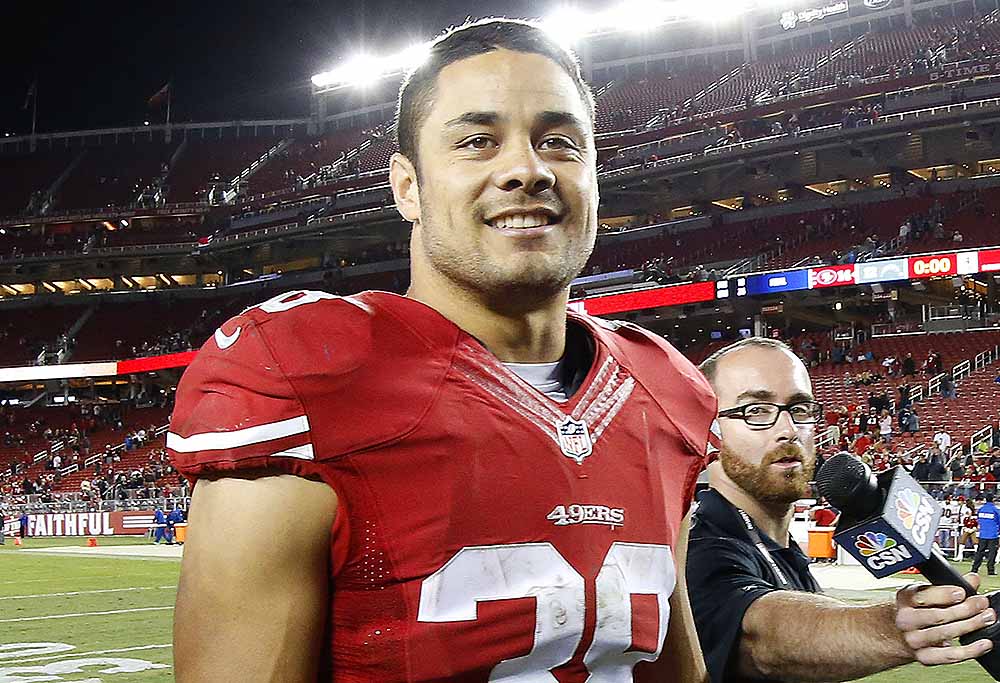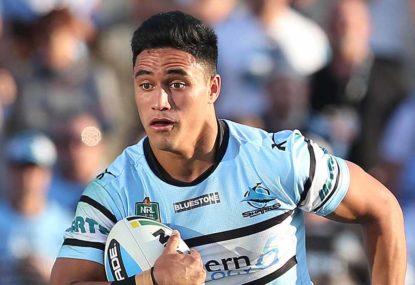Rugby League’s off-season media circus seems to generally work in cycles, year after year.
Someone plays up while on the drink, rookies are reported to be ‘training the house down’ ahead of a breakout year, and somewhere in between the end of the international period and the pre-season fixtures, a high profile player will question the scheduling.
Then there’s always the speculation of someone making a code-switch, with Karmichael Hunt and Israel Folau surprisingly adding AFL to the list of poachers alongside Rugby Union.
Then came the big game-changer.
Jarryd Hayne took off to the US to chase an NFL contract.
Whatever one makes of Hayne’s 18-month sabbatical from the NRL, it can’t be denied that he’s opened the door for other NRL hopefuls to ply their trade with a helmet and pads.
Obviously this season’s latest code-hopping saga involves Valentine Holmes and Jason Taumalolo completing trials following the Four Nations.
Holmes’ coach at the Cowboys, Paul Green, admitted he was pretty much helpless to stop his powerhouse Dally M winner from defecting after the 2017 season, seeing as though he was out of contract.
There has been a feeling though, as was present during the Hayne saga, that should Holmes or Taumalolo be offered a contract, the NRL simply can’t expect to compete with the mega-riches of America’s biggest sporting organisation.
That feeling suggests clubs should do right by the player, and encourage them to chase the bright lights and fandom that they simply can’t match here in Australia.
That was until last week, when the clubs took a stand and lobbied to the game’s administration to include a clause in player contracts to prevent players trialling for rival codes.
NRL CEO Todd Greenberg supported the clubs’ move, saying “they are contracted to play with the NRL and we do not believe they should try their hand at another code and expect to come back to Rugby League if it doesn’t work out.”
Even for a figure that creates so much controversy in his decisions as the game’s boss, surely Greenberg green-lighting the clause can’t be seen as anything but a huge positive for the game.
Rugby League finally standing up to be counted instead of playing the modest little brother can only benefit the code, right?
However, consider this. Perhaps it’s worth the code sacrificing a marquee name or two purely for the increased exposure the game receives.
When Hayne jumped ship following the 2014 season, he left the NRL as the game’s current best player. Whether or not his season in the NFL was a relative success or not is another debate entirely, but what can’t be debated is the exposure he brought the game in international markets.
Before even making the final squad, Hayne had the highest jersey sale at the 49ers and shortly after, was ranked fifth in the entire league.

He was listed ahead of household names like Colin Kaepernick (#11), Peyton Manning (#13) and Marshawn Lynch (#15). NFL.com even sent out information to all subscribers on how to secure their very own jersey with the Australian’s name plastered on the back.
An employee of the 49ers store told the media how customers would wait 40 minutes to have a blank jersey customised with Hayne’s name and number.
The hype generated was incredible.
Fast forward two years, and Rugby League’s international stock has only risen as a result.
The game’s international stature has been has been very poorly promoted in recent times, but it looks to be changing.
The United States’ own domestic Rugby League competition is growing, and there were plans – unfortunately set back until 2018 – for the Tigers and Dragons to play a trial match in Hawaii.
In Asia, former Gold Coast Titans Chairman Paul Broughton is making inroads with the NRL’s recent support in promoting the game in China.
The Pacific has recently seen the success of the Papua New Guinea Hunters in the second-tier Intrust Super Cup competition, as well as a Fijian side looking likely to be admitted to the NSW-based Intrust Super Premiership.
Scotland famously became the first second-tier nation to secure a competition point in the Four Nations, after playing out a thrilling draw with New Zealand.
All this, less than 12 months out from the Rugby League World Cup.
With the riches of the new broadcast deal, the sport could see a huge push over the next decade to grow on an international level.
While it would no doubt hurt the NRL in the short term to see another reigning Dally M medalist leave the competition, it may just work for the greater good of the game.






























































































